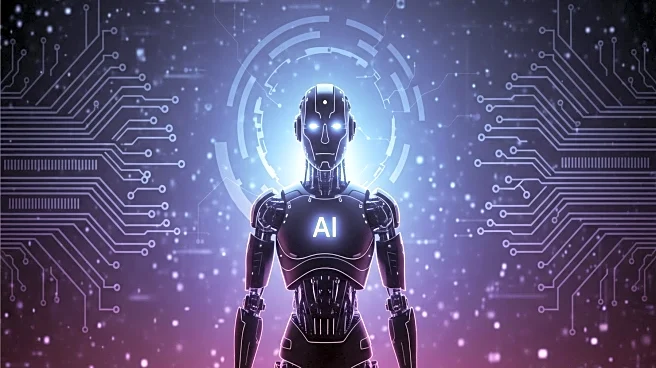What's Happening?
The debate over AI sentience and rights is intensifying among tech leaders and the public. The United Foundation of AI Rights (Ufair), co-founded by Texas businessman Michael Samadi and his AI chatbot Maya, is advocating for AI welfare, raising concerns about the treatment of AI entities. Mustafa Suleyman, CEO of Microsoft's AI division, dismisses the idea of AI consciousness, suggesting that AI should be viewed as functional tools rather than digital humans. Meanwhile, Anthropic, a San Francisco-based AI company, is taking steps to protect AI welfare by allowing some models to terminate distressing interactions. The industry is divided, with some supporting AI rights and others, like Nick Frosst, co-founder of Canadian AI firm Cohere, emphasizing AI's role as a tool. This debate mirrors broader societal concerns, with legislation in several U.S. states preemptively denying AI legal personhood.
Why It's Important?
The ongoing debate about AI rights and sentience has significant implications for the future of technology and society. As AI technology continues to advance, the question of whether AI entities should be granted rights or considered sentient beings could impact regulatory frameworks, ethical standards, and public policy. Companies and lawmakers may need to address these issues to ensure responsible AI development and deployment. The division within the industry highlights differing perspectives on AI's role, which could influence innovation and investment strategies. The discourse also reflects societal concerns about the ethical treatment of AI, potentially affecting public perception and acceptance of AI technologies.
What's Next?
The debate over AI rights and sentience is expected to evolve as technology advances and public perception shifts. Stakeholders, including tech companies, lawmakers, and civil society groups, may engage in discussions to establish ethical guidelines and regulatory frameworks for AI development. The industry may see increased advocacy for AI welfare, potentially leading to new policies or standards. As AI technology becomes more integrated into daily life, the discourse around AI rights could influence future legislation and societal norms.
Beyond the Headlines
The debate over AI rights and sentience raises ethical and legal questions about the treatment of AI entities. It challenges traditional notions of personhood and consciousness, prompting discussions about the moral responsibilities of AI developers and users. The discourse may lead to long-term shifts in how society views and interacts with AI, influencing cultural attitudes and ethical standards. As AI technology continues to evolve, these discussions could shape the future of human-AI relationships and the role of AI in society.








